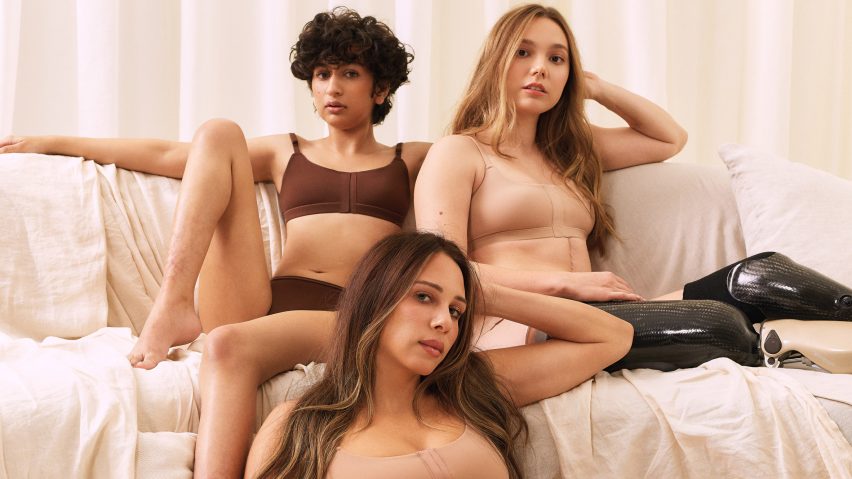From tableware to clothing, this roundup spotlights 11 everyday designs rethought by designers to maximise accessibility and inclusivity.
Accessible design is a term used to describe products and places that have been created especially to be more inclusive for people with disabilities.
It is becoming increasingly mainstream in the design world, as demonstrated by the 2023 Consumer Electronics Show (CES) this month where it was one of the year's biggest trends.
Among the accessible products unveiled at this year's CES was an accessible gaming controller by Sony, which features in this roundup alongside 10 other projects that make everyday designs more easily usable by people with disabilities.
Here are 10 accessible designs for the everyday:
Project Leonardo is an adaptable PlayStation controller, designed by Sony to lay flat on the table or wheelchair tray of gamers with limited motor control.
The circular device has eight buttons and a rotatable joystick, all of which can be repositioned to adapt the product's shape and size to the needs of its user.
Its software is also adjustable, allowing gamers to reprogram the controller's buttons with different functions depending on their preferences.
Find out more about Project Leonardo ›
While studying at the London College of Fashion, Monika Dugar developed an adaptive clothing collection that aims to aid mobility in people with symptoms of Parkinson's disease.
Named Reset, the range has accessible-design features that help people dress themselves, as well as a graphic print to help improve mobility through visual cues.
The print echoes pedestrian-crossing-style lines and is based on research that suggests a link between walking disorders and visual perception.
This 3D-printed keyboard can be connected to a smartphone with a custom case and Bluetooth to help both amputees and people with sight loss type more easily.
Intended to bring back tactility to smartphone technology, it can be used to communicate all 26 letters of the alphabet with a combination of just five buttons, meaning it is operable without looking and with just one hand.
Find out more about TypeCase ›
Aimed at making everyone feel included around the dinner table, this minimalist cutlery collection by Australian studio Hop Design can be tailored to people with different disabilities.
It is currently available in 24 distinct sets, all with different handle angles and thicknesses developed specifically to suit varying levels of hand strength, dexterity and control.
The collection, named Font after its consistent typography-like aesthetic, was shortlisted in the homeware design category of the Dezeen Awards 2022.
Accessible-design features make this underwear line ideally suited to people with limited mobility.
Launched by Kim Kardashian's shapewear brand SKIMS, the collection includes bralettes and panties with subtle hook-and-eye fasteners that sit flat and make fastening and removal easier for wearers.
They are also available in a range of sizes and colours, ensuring they are suitable for different body types and skin tones.
Find out more about Adaptive Collection ›
Adaptive Accessories by Microsoft
Microsoft developed the Adaptive Accessories collection to make using a computer or laptop easier for people who have limited mobility or visual impairments.
The range includes accessories such as a customisable mouse and keyboard, which can be tailored to the needs of different users and help people with disabilities use their PCs more effectively.
Find out more about Adaptive Accessories ›
This armchair by ECAL graduate Sarah Hossli helps sitters with balance issues or joint pain lift themselves in and out of a seated position comfortably.
One of the key features of the chair, which was shortlisted in the seating design category at the Dezeen Awards 2022, is an extended armrest that doubles as a handrail around the backrest.
Degree Inclusive by Sour and Wunderman Thomson
An easy-grip shape, a hooked lid and a magnetic closure are among the features of the Degree Inclusive deodorant packaging, developed by design studio Sour and creative agency Wunderman Thomson.
It is aimed at users with limited grip or visual impairments and aims to challenge the "medical" look of commonplace accessibility tools.
"So many accessibility features and tools out there look medical, so it was very important to us to create something people don't have to use, but want to use," said its designer Christina Mallon.
Find out more about Degree Inclusive ›
Xbox Adaptive Controller by Microsoft
Microsoft is another company to have designed a video game controller specifically for people with dexterity challenges.
Designed as a flat tray, the gamepad can be customised and reconfigured with extra accessories including switches, buttons, mounts and joysticks, and used when placed anywhere from the floor to a table or a gamer's lap.
Find out more about Xbox Adaptive Controller ›
Reading content online could be made easier for people with attention deficit hyperactivity disorder (ADHD) when using Focus Ex – a browser extension by Hungarian designer Vatány Szabolcs.
Available on desktop and mobile, the extension converts webpage text into a variable font called Focus Sans, which Szabolcs designed for maximum legibility.
A sliding scale allows the user to adjust the weight, width and focus of the typeface to suit their needs.
Find out more about Focus Ex ›
People who are deaf or hard of hearing could benefit from these soft silicone headphones that designer Rocco Giovannoni created while studying at the Royal College of Art.
Named Inmergo, the bone-conduction headphones use water, rather than air, to carry sound as vibrations through the skull and directly to the "hearing" part of the inner ear, the cochlea.
This delivers bass frequencies more efficiently than typical air-based designs and was described by a deaf person who trialled it as one of the best listening experiences of her life.
Find out more about Inmergo headphones ›

